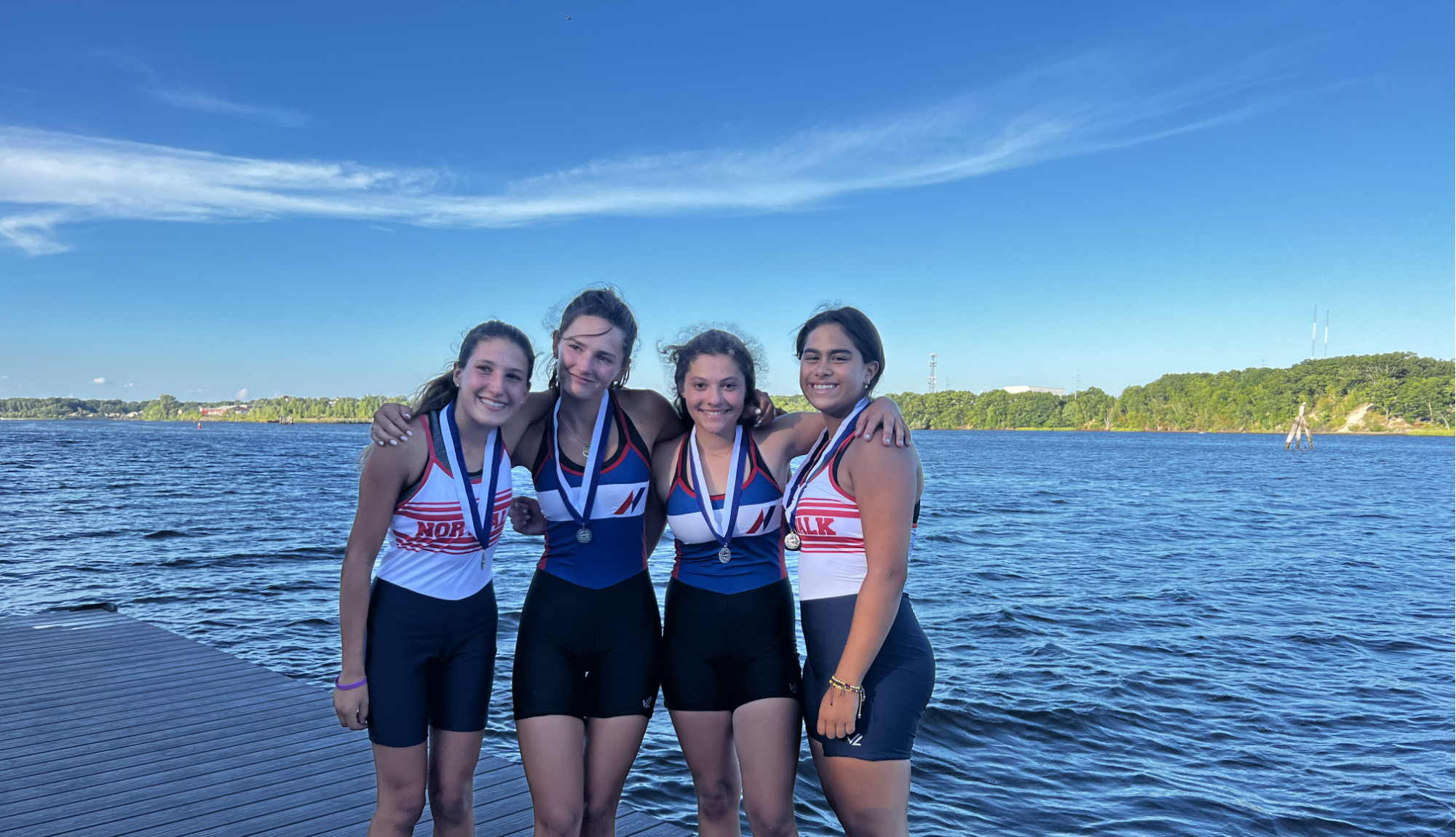Below is an article written by a parent of one of our rowers, with contributions from many others who have successfully gone through the process and rowed competitively, many with scholarships, at colleges like Bucknell, Boston College, Boston University, Duke, Northeastern, University of Washington, etc.
Highly competitive Division I schools actively recruit rowers. At these schools, the coaches have a tangible impact on the admissions process, and there are even scholarships available for especially promising young athletes. At Division II and III schools, admissions committees will often look to support Olympic sports like rowing. If you would like to row in college, whether Division I, II or III, follow the same steps listed below. In terms of the amount of pull the college coaches have, a good rule of thumb is that the more competitive the team, the more pull the coaches are likely to have. But in today’s highly competitive college admissions process, all help is welcome.
There is an added point. Rowing is an official NCAA sport for women, meaning that recruiting and participation is governed by the rules of the NCAA. It also means that there are generally more rowing and scholarship opportunities at Division I schools. For men, while there are quite a few colleges that have Varsity Men’s rowing programs that are supported by the school, many of the competitive rowing teams are actually Club sports – “unofficial teams” that have limited to no support from the school. Club teams generally have little influence in the admissions office. Don’t let that scare you away from some schools, however if you want to row. Many men’s college club teams row competitively in the same regattas as the Varisty programs.
So, how do you go about getting recruited by college crew teams? First and foremost, do well in school! Continue to build your GPA. You can win medals in competitive regattas and improve your Erg scores, but keep hitting the books! For some, rowing can be a tie-breaker, but will not overcome a mediocre GPA or SAT scores. Beyond that, what are the mechanics of recruiting?
First, understand that if you want to be recruited by college crew teams, your admissions schedule is moved up. If you are fortunate enough to be recruited by a Division I school, they will expect you to select your school by early fall of your senior year. Most of the action takes place during your junior year. Remember, the schools prefer to see you, the athlete (and not your parents), as the main point of contact. So clean up your e-mail and keep on top of your in-box, and read your snail mail.
When you join Norwalk River Rowing:
- Get a “serious” email address, for example, firstinitial.lastname@…. “funnyfrog99@…” does not tell someone who you are. And some may have a hard time taking you seriously.
- Start a Rowing Resume
- Create your profile on USRowing’s Row On Recruiting database.
- (Winters) Participate in indoor rowing competitions each winter, e.g. CT Indoor Rowing Championships. These sorts of competitions are amongst the few places where coaches can see what YOU can do, and if you do them each year, how you have improved over time.
- (Summers) Sign up for a summer rowing program, such as that offered by Norwalk River Rowing. Not only do your continue to hone your rowing skill and strength, NRR travels to large and small regattas over the summer, including those that attract attention of college coaches across the county. Keep in mind, they are not allowed to contact you until after July 1 before your senior year. But they can watch you!
Summer Before Your Junior Year:
- Begin to identify schools you might be interested in. Cast your net widely at this point.
- Sign up for the Norwalk River Rowing summer racing program.
- Think about scheduling your initial SAT testing for sometime in the November-February time frame of your junior year. If you are considering any SAT prep, think about this time line as you plan your upcoming year.
- Visit some college campuses to see what kind of school interests you. Something to think about – would you like that school even if you did not row there?
Fall and Winter of Your Junior Year:
- From September 1 of your Junior year, college coaches generally are permitted to send you letters and other materials, and even respond to e-mails you send, but are not permitted to call you. You may call them, but they may not call you.
- You should go onto the rowing recruiting sections of the web sites for colleges you are interested in and fill out the rowing recruiting forms. Keep a list of these colleges, and the e-mail addresses of their coaches (often the freshman coach serves as the main point of contact for high school athletes). Continue to cast your net widely at this point, but try to be realistic. If you are familiar with Excel, it is a good place to keep your list, since you can sort and filter the list as you build columns.
- Go onto the main college admissions web sites of the schools you are interested in and sign up to express an interest in admission and begin receiving information from the school. Make a note on the college list from above as to whether you’ve contacted the admissions office. If you are interested in a school, be sure you contact BOTH the admissions office and the coach.
- Sign up for Indoor Rowing competitions, as mentioned above.
- Keep your USRowing Row On profile updated
- Add your profile to other recruiting databases like beRecruited.com
- During the year, update the coaches by e-mail with new Erg scores, rowing achievements, new GPAs, PSAT and SAT scores, etc. Keep track on your list of what you send to whom, so you don’t leave any schools out, or send the same thing to the same coach twice.
- Take the SAT’s, and keep improving your GPA.
- Ask your current coach if you might qualify for any regional or national rowing development camps, and apply.
Spring of Your Junior Year
- Try to narrow down the list of schools you are most interested in.
- Visit some of the schools you are interested in. Make sure you register with the admissions office and take the official tour when you are there. Try to arrange a meeting with the rowing coach and get a tour of the boathouse.
- Keep updating the coaches by e-mail with new Erg scores, rowing achievements, new GPAs, and SAT scores, etc.
- You may ask your current coach to e-mail a note to a few of the coaches at the schools you are most interested in. Respect your current coach’s time, and only ask him or her to send notes to the few schools you are most interested in. Be sure to provide him or her with the contact information of the coaches you want him or her to write to.
Summer Before Your Senior Year:
- Recruiting begins in earnest on July 1 before your senior year. At this point, college coaches are generally permitted to contact you up to once per week. (Rules vary somewhat between Division I, II and III schools.)
- Sign up for the college fairs at the bigger summer regattas if you attend – Independence Day Regatta, USRowing Club Nationals (these are generally open only to rising college seniors).
- Narrow your list of schools.
Fall of Your Senior Year:
- Let the college coaches on your short list of schools know they are on your short list. Ask them what your chances of admission are. You are often asked to submit academic materials (transcripts, test scores, academic resume) for a “pre-read”. This is the college coaches chance to show your school credentials to the admissions office to see your academic stats are within range.
- If invited, make “official visits” to your top schools. For Division I, you are not permitted more than 5 such visits, but you may only wish to make 2 or 3. Only go on official visits where you are seriously considering the school. They take up valuable time of you, your parents and the coaches. On “Official Visits”, your expenses are typically covered by the crew team. You spend all day (and sometimes overnight) with the team, get to know your potential teammates, meet personally with the coaches. While it is their chance to size you up, it is also your chance to see if the team is a good fit for you – not just in terms of rowing, but also attitude and spirit.
- Get a feel from the coach where you stand in terms of their desire to support you for a spot on the team.
- Don’t let recruiting coaches pressure you until you have had a chance to consider your options. But do start thinking about the schools in terms of your first, second and third choices.
- Narrow your list down further to early action and early decision schools, then apply early to that school (or those schools). Coaches have the most influence early in the process.
- Consider another crack at the SAT’s.
- Keep hitting the books .
- Don’t stop the application process after you submit any early applications. While you can keep your fingers crossed for a “thick envelope” in response to your early application, you should be prepared to receive a “thin envelope” even if you were given to believe that your chances for admission were good. So continue the application process and continue to talk to coaches at other schools on your list as you wait for responses to any early applications.
Your Major Take-aways:
- You are going to college to get a degree, not to become a professional rower – so choose a college first based on whether you like it and feel it is a good fit for you.
- You are your best advocate. Don’t wait for them to come to you. Let coaches know that you are interested and what you can bring to the team.
- You will feel lots of pressure from all sides. Remember to take a deep breath, keep calm. You will get through this, and good things await you no matter where you end up.
For more information about the rowing recruiting process, check out the US Rowing article at: http://www.usrowing.org/DomesticRowing/YouthRowing/CollegeRecruitingInfo/CollegeRecruitingGuide.aspx.
Thank you for Rick Bauerfeld for starting up the article, and to Ann Sullivan, Susan O’Connor, Elisabeth Stonehill for their contributions.

